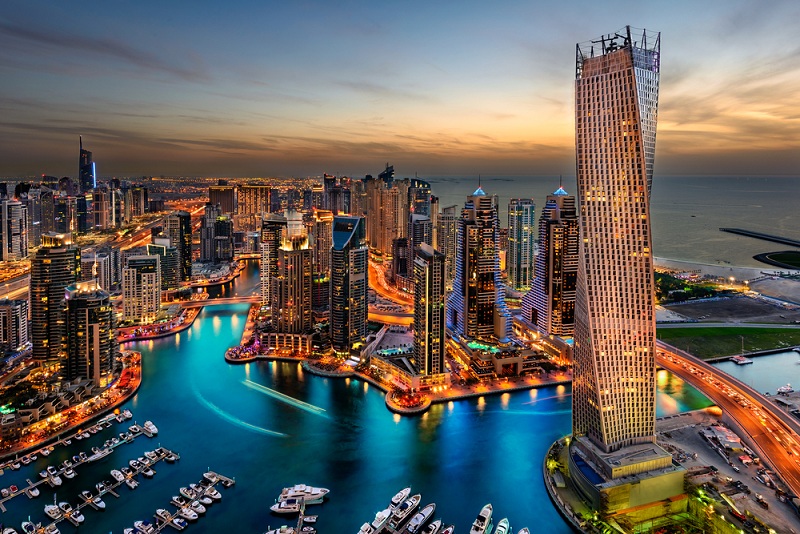
DUBAI: The global reopening theme bode well for hard hit UAE indices as Dubai Financial Markets (DFM) index finished January up 9.4% while its Abu Dhabi peer rallied 12.2% over the same period.
“We remain optimistic on an economic recovery in 2021, especially as the country continues to handle the pandemic crisis with vigilance,” Al Mal Capital noted in a commentary.
Financials and Telecommunications contributed most to the strong index showing with FOLs coming through to index heavyweights FAB and Etisalat.
Dubai introduced new restrictions to curb the spread of COVID-19 amidst all time high daily infections approaching the c.4k mark.
Nevertheless, the UAE made strong leaps on the inoculation front, administering c.3.2m doses as of month end, on track to reach their 50% target by Ql. In addition, the Abu Dhabi government offered AED 6bn relief program for SMEs, and Dubai launched its 5th pandemic relief package, worth AED 315m.
US Equities began January with the worst start to a year to finish flat over the month. An unprecedented second impeachment served to Trump, new COVID strains emerging and retail investors netting chaos on Wall Street induced volatility to the markets before a strong set of earnings from big tech names resumed the equity rally.
The S&P 500 finished January flat, while the DOW was down 1 percent over the same period. The MSCI Emerging Markets Index continued its strong December showing, rising 6.2% over January. The S&P, Pan Arab Index lagged in comparison, nonetheless finishing in the green, up 2.9%.
The Tadawul finished Jan up 1.1% as Saudi made progress on the vaccine front, with more than 300k people vaccinated against COVID-19.
“We think this is instrumental in delivering an economic recovery, particularly within the tourism and consumer space. More progress with Qatar has been made, as Saudi joined GCC peers to reopen borders,” the commentary added.
“Saudi’s unemployment rate declined 0.5% to 8.5% in Q3 as restrictions eased, yet we remain cautiously optimistic as travel restrictions were reintroduced”.
Portfolio holding eXtra reported strong Q4 earnings, up 41% y/y, on higher margins and a now profitable finance arm Tasheel. “We remain confident in management’s ability to deliver growth to investors both through their consumer finance arm and improving market share within their core electronics business.”
Egypt is currently witnessing the second wave of the pandemic, but the go ahead for inoculating has been given. “This is central to tourism recovery, however we think this could lag MENA peers as logistic requirements may prove to be cumbersome.”
Nevertheless, the IMF has increased growth outlook for Egypt over 2020-2021 to 2.8% from 2% previously. The CBE also extended two initiatives by six months until June 30, 2021, which instruct banks to remove financially distressed companies from the blacklist, lift restrictions on their respective assets, and suspend legal action taken by the banks.
The Finance Ministry of Egypt also released its expectations of a 7.9% budget deficit vs a 6.3% target, mainly weighed lost revenues over the March-June period as VAT revenues fell 55-80% in certain sectors.
Portfolio holding, Cleopatra Hospitals was denied by Egypt’s Competition Protection Authority to buy Alameda Healthcare Group on the grounds of potential monopolistic implications on healthcare prices and investment opportunities in the country.
“We like the name as a high-quality play on Egypt’s underserved healthcare sector”.
Another holding, ObourLand, reported Q4 2020 numbers with recurring earnings up 40% y-o-y despite lower white cheese volumes, helped by higher gross margins within the segment, up 6.8% y/y.
“Elsewhere in MENA, we continue to see the impact of the pandemic on other GCC states, with Oman selling its third issuance in less than three months, and Bahrain planning to sell dollar bonds to alleviate the pressure on its budget deficit, while Qatar forges ahead with conflict resolution. We are constructive on Qatar underpinned by border re-openings and World Cup 2022,” Al Mal Capital noted.
Coming to portfolio holdings – Tabreed declared that, for a total consideration of AED 963mn, it has acquired Saadiyat Cooling LLC from Aldar Properties PJSC and Saadiyat District Cooling Sole Proprietorship LLC, cementing Tabreed as Abu Dhabi’s largest district cooling provider.
January also saw Emaar sell its 100% stake of ASV for AED 750m as the business monetizes unlisted assets to free up cash. “We expect Emaar to continue to unlock value from non-core assets, given their ownership of c.5k hotel keys across 20 hotels”.
Meanwhile FAB, agreed to buy Bank Audi Egypt, who owns total assets of EGP 83.2bn and a network of 53 branches that complements FAB’s 17 branches in the country.
FAB also released clarity on shareholders on its website, which could have implications on its FOL, and sequentially passive inflows via MSCI of c.USD 315m (c.21 days).
“We continue to like the bank on fundamentals as it remains well-positioned to benefit from investment programs via higher oil output over the next 4 years.”
Etisalat discussed increasing the FOL to 49% from just 20%, suggesting c.USD 1bn in passive inflows via MSCI and FTSE. “Flows aside, we expect Etisalat to post a U-shaped recovery as the business benefits from a rebound in mobility, tourism, and 5G roll-out, while Free Cash Flow is supportive of payouts at attractive yields of 5-6%.
Full report here:
Leave a Reply